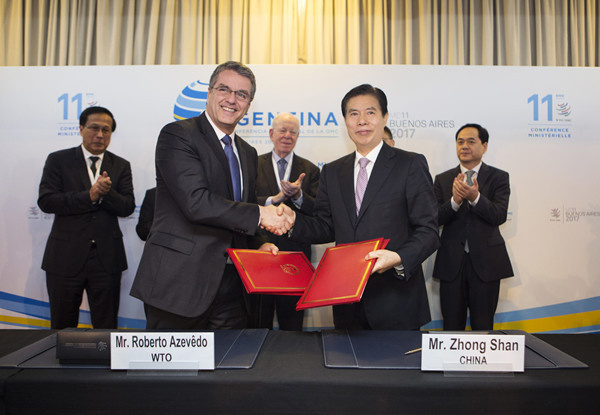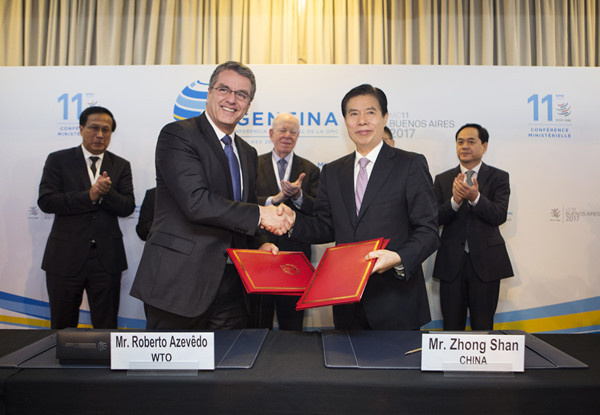By Zhang Xiangchen

The World Trade Organization (WTO) commenced its seventh trade policy review of China on July 9. During the week-long review, WTO members are expected to evaluate China’s performance since its accession to the organization, focusing primarily on the last two years.
Before the review began, China’s State Council Information Office released a white paper titled "China and the World Trade Organization" in late June as a self-assessment.
Over the past 17 years, the WTO's influence on China has grown with time. Many worried then that the WTO entry would bring an end to China’s domestic automobile and agricultural industries. However, such worries have completely disappeared thanks to China’s rapid development.
It goes without saying that China has already become one of the major beneficiaries of economic globalization. However, different opinions are held by international community on the impact brought by China’s accession to the WTO, with confidence and doubt both existing.
Some in the Western world believe that China has not fulfilled its promises, claiming that the country adopted twisted market policies and failed to become a market economy.
Some even suggest that the world needs to tailor a new set of rules for China, arguing that current WTO rules are not applicable to such a huge country. Such claim is not surprising since the advancement of China after it entered the WTO was unexpected by many countries, China included.
Back to the days before China joined the body, it once proposed to lower the severity of a number of WTO rules, only to be told that it was included in an international “basketball game” and the “basket” would not be lowered specifically for one country. However, the “basket” has now asked to be moved exclusively for China. How the situation has changed!
With a growing China, WTO members need to adjust and adapt. They should become familiar with China’s transformation from a “work-seeker” to a cooperator and competitor in the international market, as well as its transformation into an equal negotiator in the development of international rules.
The adjustment of this mentality is thought to be the hardest part in the process. Some countries may feel unwell as their space seems to be squeezed by a new giant beside them, but they have to struggle to adjust such discomfort because the rise of China will not turn back at anyone’s will. If they cast aside their bias, they will be able to see a mild and peaceful China beneath.
China also needs to adapt to how its role and influence has changed in the international arena. I still remember China’s participation in the Doha negotiations, not long after its accession to the WTO. As a developing country and a new member, we raised a series of special and differential requirements: less requests, lower obligations, longer transition periods and later liberalization.
I was the initiator of what were considered reasonable requests at that time, but the world’s expectation as well as China’s capability have gone through dramatic changes over the last 17 years. China is still a developing country that has vast space for improvement in both the size and quality of its economy. However, it’s true that China needs to make greater contributions and add Chinese wisdom to global trade liberalization and investment facilitation, as well as help create an in-time reform of the multilateral trade system.
China refuses to accept the characteristics that have been thrown around to describe it, refuting claims that it runs under a system of state capitalism or commercialism, or that it's a market twister. Anyone that doubts China’s open economy status should refer to the white paper, as facts speak louder than words.
(The author is Chinese permanent representative and Ambassador to the WTO Zhang Xiangchen)
Before the review began, China’s State Council Information Office released a white paper titled "China and the World Trade Organization" in late June as a self-assessment.
Over the past 17 years, the WTO's influence on China has grown with time. Many worried then that the WTO entry would bring an end to China’s domestic automobile and agricultural industries. However, such worries have completely disappeared thanks to China’s rapid development.
It goes without saying that China has already become one of the major beneficiaries of economic globalization. However, different opinions are held by international community on the impact brought by China’s accession to the WTO, with confidence and doubt both existing.
Some in the Western world believe that China has not fulfilled its promises, claiming that the country adopted twisted market policies and failed to become a market economy.
Some even suggest that the world needs to tailor a new set of rules for China, arguing that current WTO rules are not applicable to such a huge country. Such claim is not surprising since the advancement of China after it entered the WTO was unexpected by many countries, China included.
Back to the days before China joined the body, it once proposed to lower the severity of a number of WTO rules, only to be told that it was included in an international “basketball game” and the “basket” would not be lowered specifically for one country. However, the “basket” has now asked to be moved exclusively for China. How the situation has changed!
With a growing China, WTO members need to adjust and adapt. They should become familiar with China’s transformation from a “work-seeker” to a cooperator and competitor in the international market, as well as its transformation into an equal negotiator in the development of international rules.
The adjustment of this mentality is thought to be the hardest part in the process. Some countries may feel unwell as their space seems to be squeezed by a new giant beside them, but they have to struggle to adjust such discomfort because the rise of China will not turn back at anyone’s will. If they cast aside their bias, they will be able to see a mild and peaceful China beneath.
China also needs to adapt to how its role and influence has changed in the international arena. I still remember China’s participation in the Doha negotiations, not long after its accession to the WTO. As a developing country and a new member, we raised a series of special and differential requirements: less requests, lower obligations, longer transition periods and later liberalization.
I was the initiator of what were considered reasonable requests at that time, but the world’s expectation as well as China’s capability have gone through dramatic changes over the last 17 years. China is still a developing country that has vast space for improvement in both the size and quality of its economy. However, it’s true that China needs to make greater contributions and add Chinese wisdom to global trade liberalization and investment facilitation, as well as help create an in-time reform of the multilateral trade system.
China refuses to accept the characteristics that have been thrown around to describe it, refuting claims that it runs under a system of state capitalism or commercialism, or that it's a market twister. Anyone that doubts China’s open economy status should refer to the white paper, as facts speak louder than words.
(The author is Chinese permanent representative and Ambassador to the WTO Zhang Xiangchen)
 Menu
Menu
 Commentary: Two-way adjustment leads to smoother operation of world economy
Commentary: Two-way adjustment leads to smoother operation of world economy
















